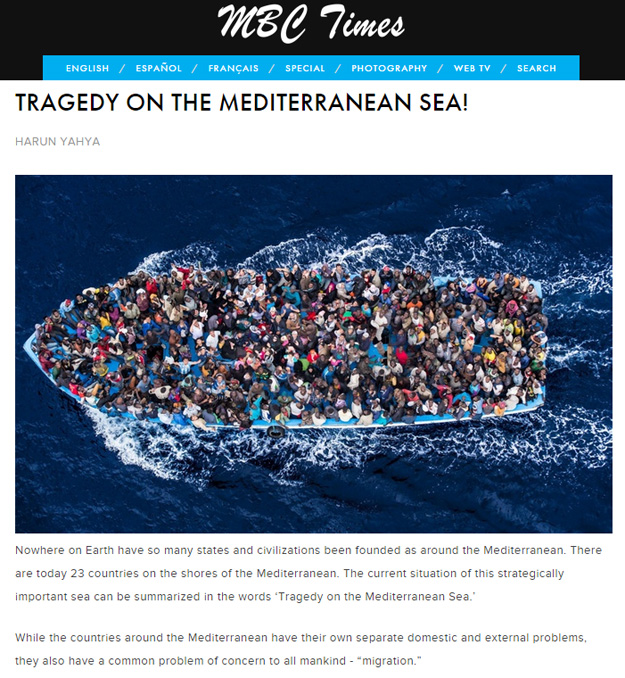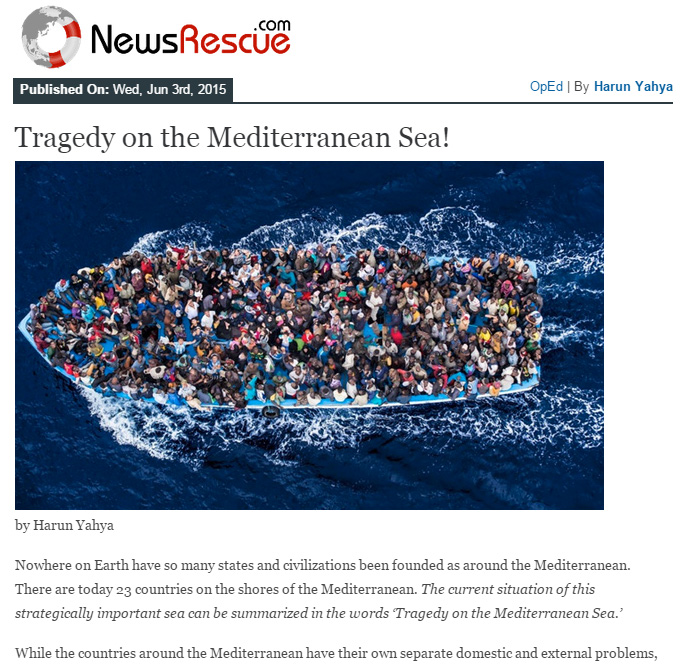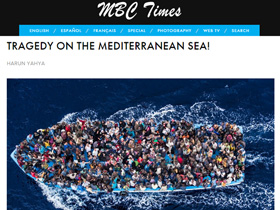
Nowhere on Earth have so many states and civilizations been founded as around the Mediterranean. There are today 23 countries on the shores of the Mediterranean. The current situation of this strategically important sea can be summarized in the words ‘Tragedy on the Mediterranean Sea.’
While the countries around the Mediterranean have their own separate domestic and external problems, they also have a common problem of concern to all mankind - “migration.”
Migrants set out from sub-Saharan and North Africa, risking death for an all but impossible aim. There are vital reasons why they undertake these risks.
These include horrific poverty in the regions the migrants come from, unemployment, instability, epidemic diseases, drought due to climate change and civil wars – in essence, they are in fear for their lives.
There are three paths that migrants typically follow from sub-Saharan and North Africa to Europe. Migrants from countries such as Mali, Gambia and Senegal try the Western route leading to Spain and Italy. Migrants from Nigeria, Ghana and Niger use the central Mediterranean route, while those from Somalia, Eritrea, Sudan and Egypt try to enter Europe from the Eastern Mediterranean.
At the point where we are today, there are two sides to the tragedy on the Mediterranean Sea. On the one hand is the EU that the migrants are trying to reach but that does not want them, and then there is Libya, a nation out of control and most recently, the point of embarkation for migrants.
Disorder and a failure to establish a proper state have led to ongoing power struggles in Libya. The absence of a proper state authority was a golden opportunity for the human traffickers. The absence of any border security in particular made it easy to pass from Africa into Libya and from there to Europe.
Today there are known to be some one million people in Libya waiting to cross to Europe.
“Tragedy on the Mediterranean Sea!”
According to figures from the French Scientific Research center, 917 migrants died on the way to Europe between 1993 and 2014.
In 2011, when the Arab Spring began, the number of migrants losing their lives on the Mediterranean was between 1,500 and 1,900, while by 2014 the figure rose to 3,500. The figure for 2015, up to April, is 1,500.
The EU, which itself has no internal borders and has made great progress on the subject of unification, has no common policy on illegal migration, since each member has its own national interests and priorities.
The EU’s approach to the migrant problem is one of trying to prevent them from reaching its territory, rather than solving the problem at its root. What is more, it is trying to do that with a very limited budget.
For example, it is trying to deal with migrant losses through Triton operations, as well as conducting rescue operations on a very limited budget by means of Frontex in an area extending some 30 miles into the open sea from the European coast. The job of Frontex, which started in 2005, is to prevent migrants from reaching the borders of Europe in an uncontrolled manner by land, sea and air.
While the EU is halting operations aimed at migrants due to a lack of funding, it is still spending in other areas. To cite but a few examples, the British Council spent £19,000 on a magic show, while the Arts Council spends £95,000 on rubbish bins decorated with lights. Ministers and officials eat £3 million worth of biscuits a year, while the European Commission spends €249,000 on private jets.
What needs to be done to halt the tragedy on the Mediterranean is not to erect a wall against people who want to migrate from their countries to the EU. People will still reach these walls with their last breath and then have no strength to return. The result, sad to say, is death.
The important thing is to be able to show these people, trapped between poverty, hunger and war, a genuine solution. One solution could be for international bodies, particularly NATO and the U.N., and major states to take a common decision to set up safe zones in Libya and other specified countries.
Once a climate has been established in which these people’s lives are guaranteed, order then needs to be re-established in the countries in question. State authority must be re-imposed and steps toward a permanent peace must be taken.
It must not be forgotten that these people are not trying to get to Europe to indulge themselves in some kind of vacation. The numbers in official reports in fact represent real human beings in real life. All countries have an equal responsibility to ensure these lives are protected.
Adnan Oktar's piece on MBC Times & News Rescue:
http://www.mbctimes.com/english/tragedy-on-the-mediterranean-sea
http://newsrescue.com/tragedy-on-the-mediterranean-sea/#axzz3bzyrtPZI



